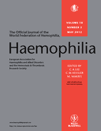
HAEMOPHILIA
Scope & Guideline
Elevating standards in medical research and care.
Introduction
Aims and Scopes
- Gene Therapy Research:
The journal is at the forefront of publishing studies on gene therapies for haemophilia A and B, exploring the efficacy, safety, and long-term outcomes of such treatments. - Clinical Management and Guidelines:
It focuses on clinical practices, including the management of bleeding episodes, surgical interventions, and the development of treatment guidelines to standardize care across different healthcare settings. - Patient-Centered Outcomes:
Research highlighting the impact of haemophilia on quality of life, mental health, and psychosocial aspects is a core area, emphasizing the importance of patient-reported outcomes. - Innovative Therapies and Technologies:
The journal covers advancements in treatment modalities, including non-factor therapies, extended half-life products, and the use of technology in monitoring and managing haemophilia. - Epidemiology and Health Economics:
It includes studies on the epidemiology of bleeding disorders, healthcare utilization, and cost-effectiveness analyses related to different treatment approaches. - Women and Bleeding Disorders:
The journal addresses the unique challenges faced by women with bleeding disorders, including pregnancy management and heavy menstrual bleeding, which are critical for comprehensive care.
Trending and Emerging
- Personalized Medicine and Individualized Care:
There is a growing emphasis on personalized treatment approaches, including pharmacogenomics and tailored prophylaxis strategies, aimed at optimizing outcomes for individual patients. - Real-World Evidence and Patient Registries:
The trend towards utilizing real-world data and patient registries to inform practice and guide treatment decisions is increasingly prominent in the journal's publications. - Mental Health and Quality of Life:
Research exploring the psychological aspects of living with haemophilia, including mental health challenges and quality of life assessments, is gaining more attention. - Digital Health and Telemedicine:
The impact of digital technologies and telehealth on patient management has emerged as a significant theme, particularly in light of the COVID-19 pandemic. - Global Health Perspectives:
There is a noticeable increase in studies addressing the global disparities in haemophilia care, focusing on low- and middle-income countries and their unique challenges.
Declining or Waning
- Traditional Factor Replacement Therapy:
As novel therapies like emicizumab and gene therapy gain traction, the frequency of publications focused solely on traditional factor replacement therapy has decreased. - Acquired Haemophilia Studies:
Research specifically addressing acquired haemophilia has become less frequent, as the focus shifts more toward inherited forms and their management. - Historical Perspectives on Haemophilia Treatment:
There seems to be a waning interest in historical analyses of treatment practices, as contemporary studies emphasize current and future treatment strategies. - Basic Science Research:
There is a noticeable reduction in publications dedicated to the fundamental biological mechanisms of haemostasis, as the journal increasingly prioritizes clinical and translational research.
Similar Journals
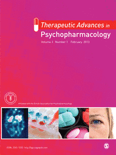
Therapeutic Advances in Psychopharmacology
Bridging Pharmacology and Psychiatry for Better OutcomesTherapeutic Advances in Psychopharmacology is a leading open-access journal published by SAGE Publications Ltd, focusing on the dynamic integration of pharmacological therapies and psychological health. Since its inception in 2011, this journal has made a significant impact on the fields of pharmacology and psychiatry, consistently earning a Q1 ranking in both categories as of 2023, reflecting its esteemed position within the scientific community. With an impressive Scopus rank placing it in the top 15% across relevant disciplines, the journal serves as a vital platform for researchers, professionals, and students eager to explore cutting-edge advancements in psychopharmacology. The open-access model, established in 2019, ensures that groundbreaking research is accessible to a wide audience, fostering collaboration and innovation in therapeutic strategies for mental health disorders. Through the dissemination of high-quality research and reviews, Therapeutic Advances in Psychopharmacology is committed to advancing understanding and practice within this critical field.
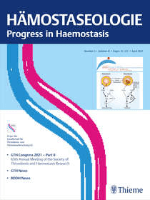
Hamostaseologie
Decoding Hemostasis: Your Source for Cutting-Edge Research and ReviewsHamostaseologie is a prominent academic journal dedicated to the field of hematology, published by GEORG THIEME VERLAG KG. With an ISSN of 0720-9355 and an E-ISSN of 2567-5761, this journal has been at the forefront of critical research and advancements since its inception in 1981, and it continues to maintain its relevance in the scientific community with a converged publication until 2024. Ranked in the Q3 quartile in Hematology for 2023, and positioned at #44 out of 137 in the Scopus Medicine Hematology category, it represents a substantial contribution to scholarly discourse. Researchers and professionals alike will find valuable insights within its pages, as it disseminates rigorous studies and reviews that address pertinent issues related to hemostasis and coagulation. While the journal does not currently offer Open Access, readers can access its valuable content through institutional subscriptions, making it an essential resource for students, clinicians, and researchers aiming to deepen their understanding of hematological science.

Journal of Hematology
Elevating Hematology Through Collaborative ResearchThe Journal of Hematology, published by ELMER PRESS INC, serves as a pivotal platform for disseminating cutting-edge research in the field of hematology. With an ISSN of 1927-1212 and an E-ISSN of 1927-1220, this journal is committed to advancing scientific knowledge and clinical practice through high-quality peer-reviewed articles encompassing all aspects of blood disorders, from basic science to health policy implications. While the journal currently operates under a traditional access model, it nonetheless prioritizes the rapid publication of significant findings, ensuring that researchers, clinicians, and students have timely access to the latest advancements in hematological research. Positioned to bridge gaps in knowledge and foster collaboration among scholars worldwide, the Journal of Hematology is an essential resource for anyone invested in this vital area of medicine.

Dermatologie
Exploring the Frontiers of Skin ResearchDermatologie, published by SPRINGER HEIDELBERG, is a prominent journal dedicated to the advancing field of dermatology. With its ISSN 2731-7005 and E-ISSN 2731-7013, this journal has established itself as a valuable resource for researchers, professionals, and students alike. Originating in Germany, the journal focuses on disseminating innovative research from 2022 to 2024, contributing significantly to the understanding of skin health and disease management. Despite its current ranking within the Q3 category in dermatology and a Scopus rank of #88/142, it provides critical insights and advances in clinical practice, epidemiology, and therapeutic modalities. With an emphasis on open discourse, it seeks to foster collaboration among healthcare professionals and researchers, thereby enhancing the quality and accessibility of dermatological research. Engage with Dermatologie to stay at the forefront of the latest advancements in skin-related health issues.
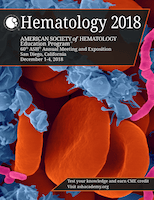
Hematology-American Society of Hematology Education Program
Transforming Hematology through Comprehensive LearningHematology-American Society of Hematology Education Program is a premier peer-reviewed journal dedicated to advancing the field of hematology through comprehensive educational content. Published by the American Society of Hematology, this journal plays a crucial role in disseminating knowledge to researchers, clinicians, and students in hematology and related disciplines. With an impressive Q1 status in the field, it ranks among the top journals at the forefront of hematological research, as evidenced by its 60th percentile ranking in Scopus' Medicine - Hematology category. Although it does not offer open access, the journal provides invaluable insights and educational resources from leading experts, focusing on the latest advancements, treatment protocols, and evolving understanding of blood disorders. Covering a wide range of topics, from basic research to clinical applications, this journal is essential for anyone seeking to deepen their expertise and stay informed on the latest developments in hematology. For further engagement, readers can access insightful articles published since 2001, ensuring a rich repository of knowledge for ongoing research and clinical excellence.
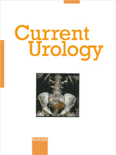
Current Urology
Shaping the Future of Urological Science and PracticeCurrent Urology, published by Lippincott Williams & Wilkins, is a leading journal dedicated to advancing the fields of urology, oncology, and reproductive medicine. With an ISSN of 1661-7649 and E-ISSN of 1661-7657, this journal has established itself as a valuable resource for researchers, practitioners, and students alike, providing peer-reviewed articles that contribute to the ongoing discourse and development of these critical specialties. Operating out of the United States, Current Urology ranks in the third quartile for oncology, reproductive medicine, and urology, reflecting its importance in the medical community. The journal’s focus on innovative research and clinical practice allows it to bridge gaps between theoretical understanding and practical application, enhancing patient care and outcomes. Although currently not an open-access journal, it offers a wealth of insights and findings that underpin contemporary urological practices and research. In an evolving medical landscape, Current Urology remains an essential platform for disseminating knowledge and fostering collaboration among experts in the field.

Thalassemia Reports
Innovating the future of hemoglobinopathy management.Thalassemia Reports is a distinguished journal dedicated to the field of hematology, focusing on the implications, management, and advancements related to thalassemia and related disorders. Published by MDPI, a renowned open-access publisher, this journal has been committed to disseminating high-quality research since its inception in 2011. With an ISSN of 2039-4357 and an E-ISSN of 2039-4365, it serves as an invaluable resource for researchers, clinicians, and students alike who are engaged in the study of hemoglobinopathies. The journal fosters easy access to peer-reviewed articles that contribute to the understanding and management of thalassemia, thus promoting collaborative efforts within the academic and medical communities. The open-access model ensures that critical findings are widely available to the global audience, enhancing knowledge exchange and innovation in the field.

ADVANCES IN THERAPY
Unveiling the future of medicine through rigorous research.ADVANCES IN THERAPY is a prestigious peer-reviewed journal published by SPRINGER, specializing in the diverse fields of medicine and pharmacology. Established in 1984, this influential journal has become an essential resource for researchers and professionals, boasting a commendable impact factor and categorically ranking within the Q1 quartile in both Medicine (Miscellaneous) and Medical Pharmacology as of 2023. With an impressive Scopus ranking at #52 out of 272 in the realm of medical pharmacology, it places itself in the top 81st percentile, underscoring its importance in advancing therapeutic knowledge and practices. Although the journal is not open access, it provides invaluable insights and the latest research findings in therapies that significantly impact patient care, making it a vital reference for clinicians, academicians, and students alike.
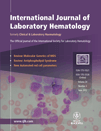
International Journal of Laboratory Hematology
Empowering researchers with cutting-edge findings in hematology.The International Journal of Laboratory Hematology, published by WILEY, serves as a vital resource in the field of hematology, delivering high-quality research findings and innovations within laboratory practices since its inception in 2007. This journal, accessible under Open Access options, showcases cutting-edge studies that span critical aspects of biochemistry and clinical laboratory methodologies. With a notable impact factor reflected in its Q2 and Q3 rankings across various categories—such as Biochemistry (medical) and Hematology—this journal stands out within the Scopus rankings, positioning itself within the 60th and 59th percentiles of its respective fields. Situated in the United Kingdom, the journal's objectives lie in disseminating pivotal research that enhances our understanding of hematological disorders and laboratory techniques, making it an essential tool for researchers, professionals, and students alike who are committed to advancing the science of laboratory hematology and its applications.

ANNALS OF HEMATOLOGY
Elevating knowledge with impactful research and reviews.ANNALS OF HEMATOLOGY, published by Springer in Germany, stands as a premier platform for advancing knowledge in the field of hematology and medicine at large. With a significant impact factor and recognized rankings—Q2 in Hematology and Q1 in Medicine (miscellaneous) as of 2023—this journal is pivotal for researchers, clinicians, and students who are keen on exploring the latest developments in blood disorders, treatments, and innovative methodologies. Its broad scope encompasses original research, reviews, and discussions that aim to foster interdisciplinary dialogue, ensuring that the latest findings and theories are accessible to the scientific community. Although not an open-access journal, its rigorous peer-review process guarantees high-quality contributions, thereby solidifying its reputation as a vital resource in the hematological field. Founded in 1991, the ANNALS OF HEMATOLOGY continues to evolve, converging invaluable insights from both basic and clinical research until 2024. For those dedicated to improving patient outcomes and advancing hematological science, this journal remains an essential reference.